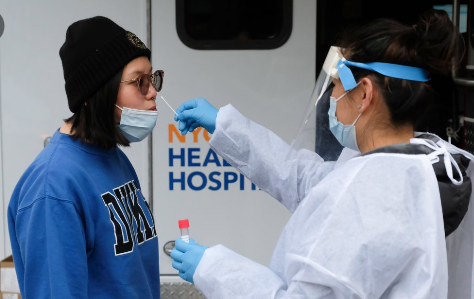[COVID-19 Testing]
Governor Murphy: “To reduce the risk of transmission across our region, we are encouraging colleges and universities to ramp up testing for students returning home.”
Photo: Twitter
Photo: Twitter
New York Governor Andrew M. Cuomo, New Jersey Governor Phil Murphy, Connecticut Governor Ned Lamont, Delaware Governor John Carney, Pennsylvania Governor Tom Wolf, Rhode Island Governor Gina Raimondo and Massachusetts Governor Charlie Baker have announced they will encourage residential colleges and universities in their respective states to provide testing for all students traveling home for Thanksgiving break to the maximum extent possible before they leave campus.
Any student who tests positive will be encouraged to isolate on campus before they can travel or detail arrangements of their safe travel home with the local department of health. These efforts will help mitigate the threat of college students returning home for the holidays importing COVID-19 into their communities. In addition, colleges should inform students and their families of relevant quarantine policies in their home state. “As everyone predicted, cases are rising as temperatures drop, and New York is not immune. With the holidays approaching, we are fighting ‘living room spread’ from small gatherings in private homes — and adding college students’ interstate travel will be like pouring gasoline on a fire,” Cuomo said. “We know this virus does not respect borders, which is why governors from across the region are working together to stop the spread. Colleges and universities have to do their part by testing all students before they leave, informing them about quarantine rules, and keeping classes online between Thanksgiving and Winter Break. We beat back the COVID beast in the spring, and by working together we can do it once again this winter.”
“With Thanksgiving and the broader holiday season fast approaching, we have to recognize that any large family gathering — particularly among different age groups — runs the risk of turning the dinner table into a COVID hotspot,” said Governor Murphy. “To reduce the risk of transmission across our region, we are encouraging colleges and universities to ramp up testing for students returning home, and for anyone who tests positive to adhere to their state’s quarantine restrictions. If we collectively recommit ourselves to the commonsense mitigation practices that got us through the first wave of this pandemic, we can save lives before a vaccine becomes broadly available.”
Governor Lamont said, “College students returning from highly infected states could accelerate the spread of COVID in Connecticut. I appreciate the joint effort of all our regional governors to clearly state the testing/quarantine rules for returning home from college.”
“There’s no sugarcoating it: this will be a difficult winter,” said Governor Carney. “We are seeing rising cases, hospitalizations and deaths from COVID-19 in our region and across the country as we enter the colder months. The holidays present a significant challenge. I’m thankful for the cooperation in our region, and will continue to urge Delawareans to do what works. Wear a mask. Don’t gather with anyone outside your household. Stay vigilant.”
“It is our collective responsibility to protect our communities and our most vulnerable from COVID-19 and to continue to work together to get through this pandemic,” said Governor Wolf. “These targeted mitigation efforts, combined with existing ones, are paramount to decreasing the spread of COVID-19. We need everyone to be united in wearing a mask, practicing social distancing, and washing our hands in order to save lives and help protect our economies.”
“As our COVID cases and hospitalizations continue to rise, it’s critical that we come together as a region to slow the spread and keep our constituents safe,” said Governor Raimondo. “We all need to be more vigilant about keeping our circles small and our masks on, while at the same time we’re continuing to ramp up asymptomatic testing across-the-board. This collaborative approach among Northeastern states will help us flatten the curve and contain spread over the Thanksgiving holiday.”
“The region is experiencing a surge in COVID cases and a surge in the serious health impacts this disease brings with it. Working together on travel and higher education policies like these, states can have a bigger impact on COVID spread as students travel for the holidays,” said Governor Baker. “Gathering with friends and family significantly increases the risk of spreading the virus and while testing and isolation guidelines can help slow the spread, it is up to everyone to wear a mask and avoid gathering indoors with people outside of your household.”
The combination of rising cases across the country — including in the northeast — due to increased transmission of COVID in small, residential settings and Thanksgiving travel has created the perfect storm for viral spread. If people proceed with celebrations in small gatherings outside of their immediate families, they risk generating a dramatic spike in cases after Thanksgiving. All Governors are urging their residents to stay home and celebrate small this year in an effort to help eliminate the risk of unchecked COVID-19 spread in the coming weeks.
The governors and their public health experts developed this guidance over the weekend at an emergency summit of northeastern governors. The governors also emphasized the importance of in-person education, especially for younger students who are less likely to learn as well remotely. Experience in the United States and Europe has shown schools can be operated safely as long as there is a low infection rate in schools.
In order to stop college-related travel spreading COVID, colleges and universities in New York, Massachusetts, Delaware, Connecticut, New Jersey, Rhode Island, and Pennsylvania will be encouraged to make testing available to all students before they leave for Thanksgiving break and inform students and their families of states’ quarantine requirements. Any student who tests positive before they leave should be permitted to isolate on campus, or may travel safely with the approval of the local departments of health. Students who are already isolating or quarantining on campus must remain in place until completing their prescribed seclusion.
In addition, the governors are strongly recommending that colleges and universities finish their fall semesters by expanding remote instruction, enabling more students to learn from home for the few weeks between Thanksgiving and winter break rather than require students to travel back to campus and then back home again in December. Half of colleges and universities across the northeast have already indicated they will be fully remote between Thanksgiving and the end of their fall semester. Colleges and universities should prioritize on-campus programs for students who did not travel or who need in-person exams or clinical and laboratory experiences.
If colleges and universities do reopen for in-person instruction during this period, all returning students should receive COVID-19 tests and comply with relevant isolation and quarantine protocols. These institutions should also double down on precautions including frequent health screenings and surveillance testing due the increased risk of COVID exposure from student travel.







